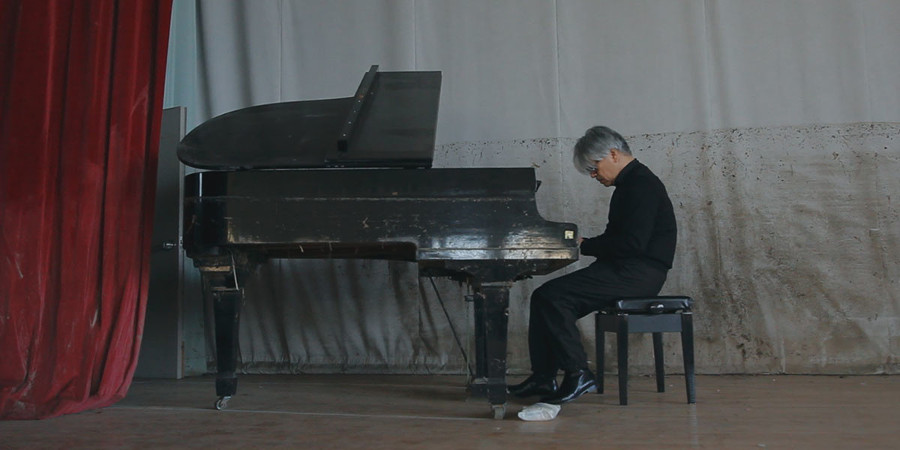About halfway through Ryuichi Sakamoto: Coda, director Stephen Nomura Schible sneaks his camera through the half-open door of an apartment studio. On the other side sits Sakamoto, playing his piano. Deep in concentration, it is only when his song is at an end that he notices Schible’s presence. Sakamoto turns, smiles coyly, and announces “you caught me”.
It’s a simple, intimate moment; one that perfectly captures the curious, yet relaxed tone of this exploration of the iconic musician, composer, and occasional actor’s relationship with work, life, and legacy.
Shot over five years, Coda takes a reverential perspective on the most challenging period of Sakamoto’s life. In 2014, he was diagnosed with Stage III throat cancer. The prolific artist, one whose career spanned several decades, was finally forced to stop his work and make his health a priority. While the documentary does not chart his process through treatment, it’s evident that by the time the chemotherapy came to an end, Sakamoto had changed.
Like so many who pursue excellence in their lives, Sakamoto’s illness served to reinvigorate his passion for the work. Despite an unquestionably monumental career – including genre-defining work with electronic band Yellow Magic Orchestra, and a classic debut score for Merry Christmas, Mr Lawrence – Sakamoto is clear that not even cancer can stop him.
“I want to create work I will not be ashamed to leave behind”, he declares, anxious to get back to it despite doctor’s orders to take it easy.
Before long, Sakamoto is working on two major projects: the score for Alejandro González Iñárritu’s The Revenant (“I’m supposed to be on a hiatus period [but] I couldn’t say no to him because I admire him too much”) and a chorale in the vein of Bach.
Sakamoto is charming, fascinating, as he experiments with sound. Whether it’s playing a Yamaha baby grand piano that miraculously survived the 2011 tsunami in Japan, or wearing a bucket on his head in the rain, he seems almost child-like in his obsession with experiencing and capturing sound in new ways.
Considering this, calling the documentary Coda – the term for a concluding passage of work – seems preemptive. So too does the film’s only noticeable flaw: it’s decision not to contextualise most of Sakamoto’s accomplishments. In fact, Schible seems so certain that anyone who is watching the documentary knows who Sakamoto is that he spends the majority of the film’s opening highlighting his subject’s endeavours as an advocate for Japan’s denuclearisation. Of course, most viewers will know Sakamoto and his body of work, but those who don’t may feel somewhat alienated as a result.
That shouldn’t stop them from watching Ryuichi Sakamoto: Coda though. More than a portrait of an artist, the documentary is a celebration of the creative process, of the pursuit of excellence, and of what it takes to define our Great Work.
Sakamoto might not be writing 45 songs in a week anymore, as he did for his Academy Award-winning work on The Last Emperor (a film he was initially only hired to act in), but he is still seeking to improve himself, and his work, every day. Though the documentary never gets overly personal with him, it his hard not to engage with, and learn from, his exceptional story.
—
Ryuichi Sakamoto: Coda is distributed in Australia by Hi Gloss Entertainment.

